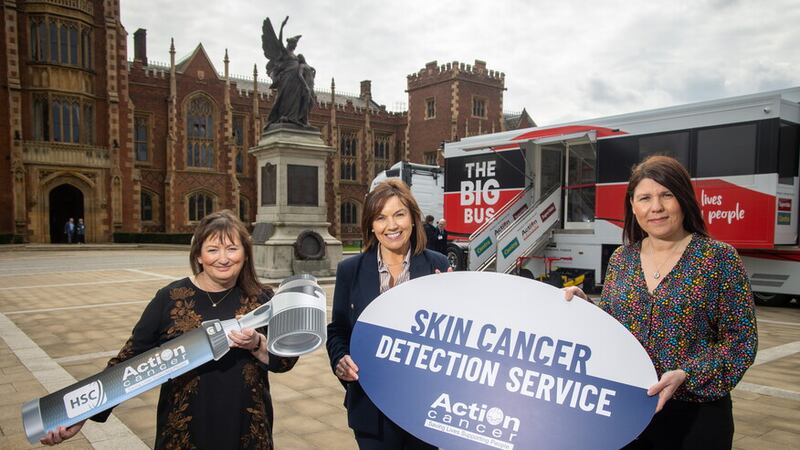A new skin cancer detection service has been launched in Northern Ireland.
The initiative by Action Cancer, in partnership with the Department of Health, aims to help people "concerned about a new or changing skin lesion".
Northern Ireland has one of the highest incidences of skin cancer in the UK, with non-melanoma the most common cancer and melanoma, which is associated with moles, the fifth.
The free skin cancer detection service is offered on the charity's 'Big Bus' alongside the existing services of breast screening and health checks.
It is hoped that the bus will visit 200 locations across the north annually, with 80 per cent of the visits to areas of high deprivation where health inequalities are greatest.
The service offers a two-stage process, with concerned members of the public, who meet the service eligibility criteria, offered in the first instance a virtual assessment with a skin cancer specialist nurse.
If the specialist nurse feels that further assessment is needed, then a face-to-face appointment is offered onboard an upcoming visit by the Big Bus; which visits all five HSC Trust areas across Northern Ireland twice every four weeks or at Action Cancer House in Belfast.
Following the face-to-face appointment, the charity then has the ability using the Department of Health recently developed dermatology photo triage referral pathway, to refer the individual directly to secondary care for further assessment.
We are delighted to announce the introduction of a new skin cancer detection service, in partnership with the @healthdpt @HSC_NI
— Action Cancer (@actioncancer) April 27, 2023
Read the full story here:https://t.co/20ytMBTlaE pic.twitter.com/4jnYidmSdm
Iona McCormack, who is heading up the new service, said: “The majority of people in NI have pale skin that tends to freckle and burn easily.
"Episodes of sun burning and tanning will increase your risk of skin cancer.
"Unfortunately, in Northern Ireland we have high usage of sunbeds and with the introduction of low-cost airlines, trips abroad to Europe and beyond are more accessible.
"Since the service became operational in January earlier this year we have conducted 388 consultations to date, including 246 virtual assessments.
"We detected several suspect basal cell carcinoma and referred to the patients’ GP for further action.
"We also made 27 referrals to dermatology in secondary care due to suspect melanoma or squamous cell carcinoma.”
Please visit www.actioncancer.org for information.








